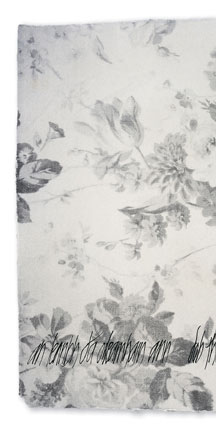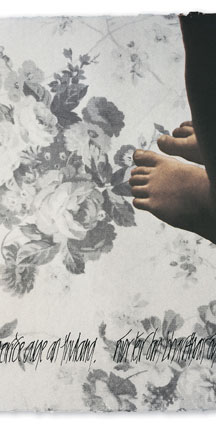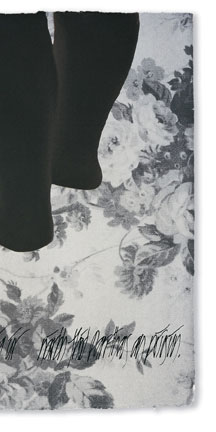|

Bean torrach, fa tuar broide,
do bhí i bpríosún pheannaide,
berar dho chead Dé na ndúl,
lé leanabh beag sa bhríosún.
Ar n-a bhreith do bhí an macámh
ag fás mar gach bhfochlocán,
dá fhiadhnaibh mar budh each dhún,
seal do bhliadhnaibh sa bhríosun.
An inghean d’fhagháil bhroise —
meanma an leinbh níor lughaide,
sí dhá réir gé dho bhaoi i mbroid,
mar mhnaoi gan phéin gan pheannaid.
Do shoillse an laoi níor léir dhóibh
acht a bhfaicdís – fáth dobróin! –
do dhruim iodhan an achaidh
tré ionadh thuill tarathair.
Mun n-orchra níorbh ionann dál
dá mháthair is don mhacámh;
do aithrigh dealbh dá dreich gil
is an leanbh ag breith bhisigh.
An leanbh dá oileamhain ann
dob fheirrde aige an fhulang,
níor léir don bharrthais óg úr
nárbh fhód Parrthais an príosún.
Seisean ag breith ruag reabhraidh,
sise ag dul i ndoimheanmain;
mairg, thrá, nach tiobhradh dá aoidh
ionnramh na mná 'sa macaoimh.
Ar bhfaicsin déar ré dreich ngil,
ráidhis an leanbh lá éigin:
ó tharla a fhuidheall ar mh’óidh,
cluineam damhna do dhobhróin.
Neimhiongnadh gé dho-neinn maoith,
ar sise, a leinibh lánbhaoith;
is rian cumhang nár dhleacht dún,
teacht d’fhulang pian i bpríosún.
An bhfuil, ar sé, sódh eile,
is aoibhne ná ar n-innmhine,
nó an bhfuil ní as soillse ná so,
ó dho-ní an toirse tromsa?
Dar linn, ar an leanabh óg,
gé taoi brónach, a bheanód,
is léir dhúin ar ndíol soillse,
ná bíodh ar th’uidh attuirse.
A n-abrae ní hiongnadh dheit,
ar an inghean, a óigmheic;
dáigh treibhe an teagh do thoghais –
treabh eile ní fhacadhais.
Dá bhfaictheá a bhfacaidh meise,
ré dteacht don treibh dhoircheisi,
do bhiadh doimheanma ort ann,
do phort oileamhna, a anam.
Os agadsa is fhearr a dhearbh,
a inghean, ar an t-óigleanbh,
ná ceil foirn fionnachtain de,
do mhoirn d’iomarcaidh oirne.
Loise an tsaoghail mhóir amuigh,
is eadh tháirreas ó thosaigh;
mé i dtigh dhorcha 'na dheaghaidh,
a fhir chomtha, is cinneamhain.
Le cleachtadh deacrachta dhe,
's nach fuair sé sódh is aoibhne,
níor cheis a ghruadh ghríosúr ghlan
ar an bpríosún bhfuar bhfolamh.
Baramhail do-bearthar dún —
an dream do bhí sa bhríosún:
lucht an bheatha cé an cúpla,
a ré is beatha bhríosúnta.
Ag féachain meadhrach Mheic Dé,
flaitheas aga bhfuil buainré,
cúis bhróin beatha gach dúnaidh,
slóigh an bheatha is bríosúnaigh. |
 
|

A pregnant woman (sorrow’s sign)
once there was, in painful prison.
The God of Elements let her bear
in prison there a little child.
The little boy, when he was born,
grew up like any other child
(plain as we could see him there)
for a space of years, in prison.
That the woman was a prisoner
did not lower the baby’s spirits.
She minded him, though in prison,
like one without punishment or pain.
Nothing of the light of day
(O misery!) could they see
but the bright ridge of a field
through a hole someone had made.
Yet the loss was not the same
for the son as for the mother:
her fair face failed in form
while the baby gained in health.
The child, raised where he was,
grew better by his bondage,
not knowing in his fresh frail limbs
but prison was ground of Paradise.
He made little playful runs
while her spirits only deepened.
(Mark well, lest you regret,
these deeds of son and mother.)
He said one day, beholding
a tear on her lovely face:
‘I see the signs of sadness;
now let me hear the cause.’
‘No wonder that I mourn,
my foolish child,’ said she.
‘This cramped place is not our lot,
and suffering pain in prison.’
‘Is there another place’, he said,
‘lovelier than ours?
Is there a brighter light than this
that your grief grows so heavy?’
‘For I believe,’ the young child said,
‘mother, although you mourn,
we have our share of light.
Don’t waste your thoughts in sorrow.’
‘I do not wonder at what you say,
young son,’ the girl replied.
‘You think this is a hopeful place
because you have seen no other.
‘If you knew what I have seen
before this dismal place
you would be downcast also
in your nursery here, my soul.’
‘Since it is you know best, lady,’
the little child replied,
‘hide from me no longer
what more it was you had.’
‘A great outer world in glory
formerly was mine.
After that, beloved boy,
my fate is a darkened house.’
At home in all his hardships,
not knowing a happier state,
fresh-cheeked and bright, he did not grudge
the cold and desolate prison.
And so is the moral given:
the couple there in prison
are the people of this world,
imprisoned life their span.
Compared with joy in the Son of God
in His everlasting realm
an earthly mansion is only grief,
prisoners all the living. |





